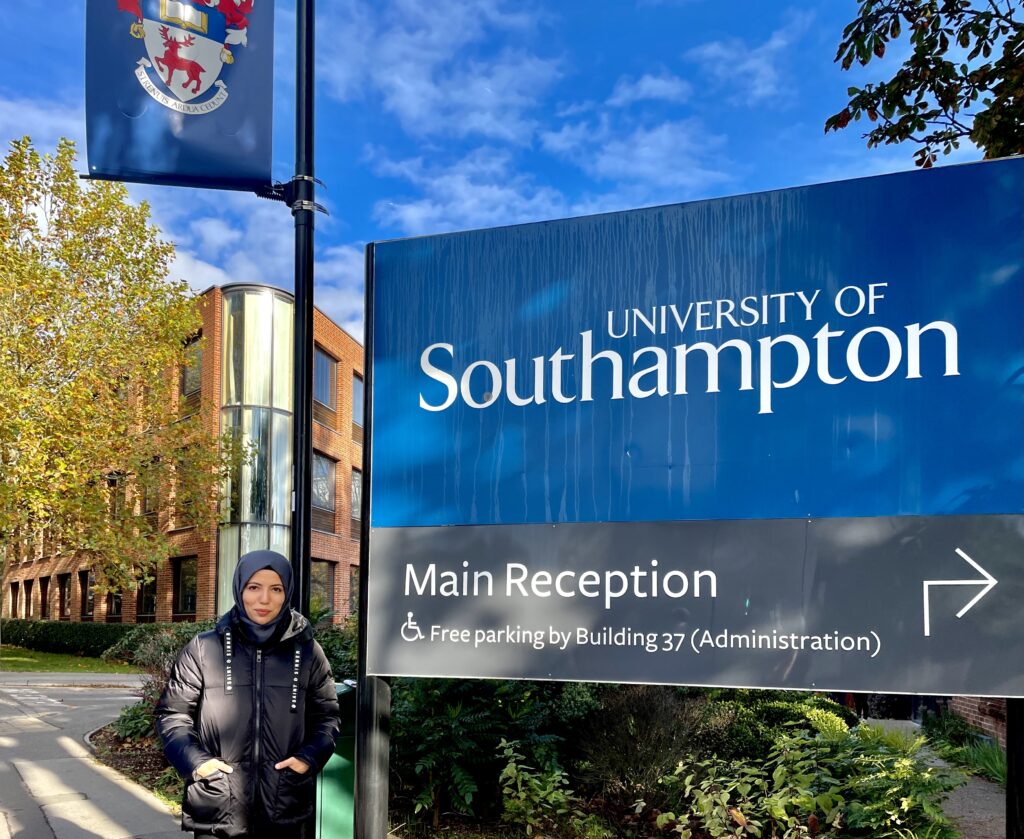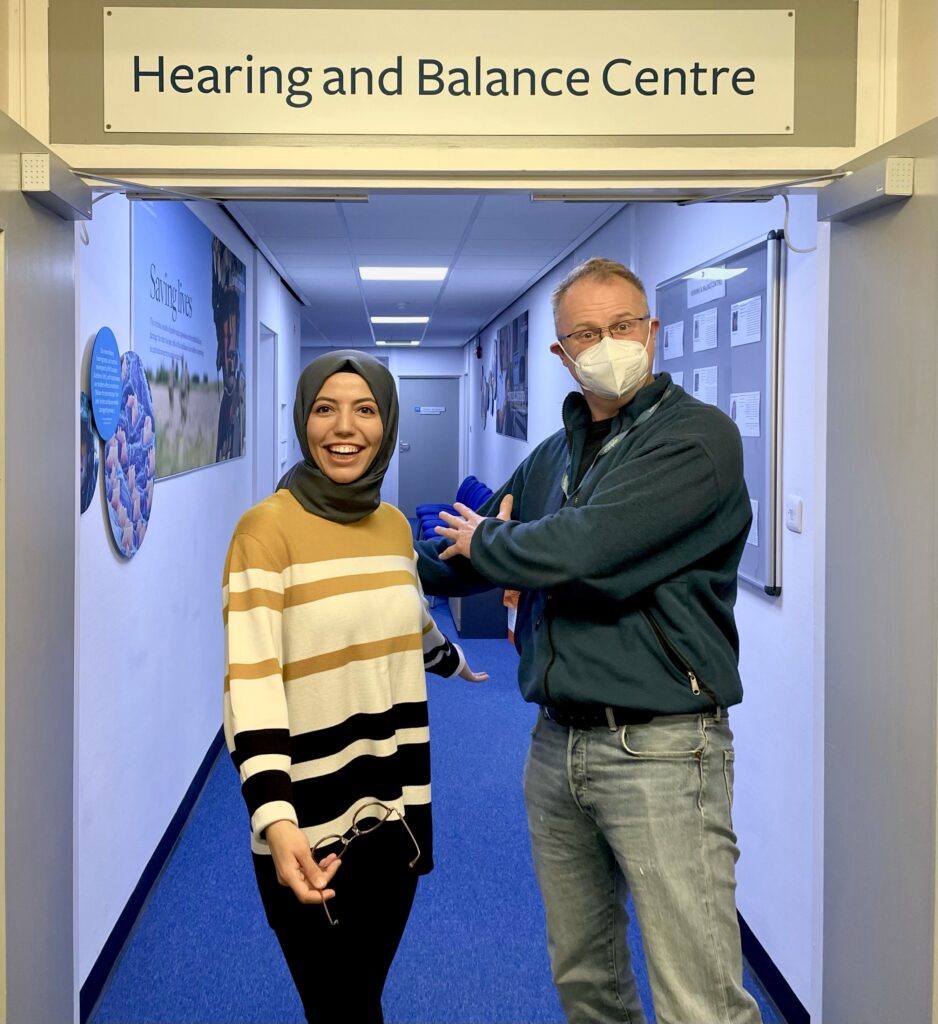Audiology Interview Series #2 Esma AKIŞ | University of Southamptom

Hi everyone, in this episode of the Audiology Interview Series, we have talked with Esma from the University of Southampton.
I thank her for the interview and hope that you will enjoy while reading!!
PS: If you have a question about herself, please comment below. You will get an answer:) So let’s start!
- Can you introduce yourself?
Hello, I’m Esma Akis and from Silifke, Mersin. I graduated from Hacettepe University Audiology department in 2017 and then won the YLSY scholarship. I started my master’s degree in Audiology at Hacettepe University Health Sciences Institute. After that, I worked as an Audiologist at Afyonkarahisar State Hospital for 1.5 years. I completed my master’s degree in 2020. I am currently doing my PhD at the University of Southampton.
- How did you meet with Audiology? Can you give us information about your bachelor’s degree?
Audiology was a popular department with a high score and a newly opened undergraduate level when I chose. After some research, it intrigued me and I preferred it. We received quality education from lecturers who are an expert in their field during my bachelor’s degree. Besides the theoretical part, we had the opportunity to improve our knowledge in Audiology with clinical internships, seminars and congresses. I also had a chance to do a summer internship in Belgium with the Erasmus Programme Student Mobility of Hacettepe University. Internship abroad, along with clinical knowledge, allowed me to explore my goals and dreams better.
- How did you start your PhD education abroad? What steps did you take until now?
I decided I wanted to improve myself academically after graduating from the BSc. Meanwhile, one of my friends recommended the YLSY scholarship to me, and I decided to apply after getting detailed information about the conditions.
- What did you pay attention to when choosing a university and research field for your PhD education?
You need to prepare a research proposal and present it to your potential supervisors while applying for a PhD abroad, unlike in Turkey. For this reason, I researched the working area of the academic staff of successful universities in Audiology. Then I decided which fields I wanted to study on, prepared the research proposal, and applied to the relevant professors.
- What challenges did you face before starting the PhD education? How did you deal with that issues?
I had difficulties planning to arrive in the UK and start my PhD while resigning from the Ministry of Health because of the COVID-19 pandemic. I had to postpone my doctorate start date since I could not resign. I stayed in quarantine after I arrived due to the COVID-19 measures taken in the UK.
- What kinds of pros and cons have been doing a PhD in the United Kingdom?
One of the most important advantages of doing a PhD in England is that all kinds of opportunities and working environments are provided for scientific research. I also think that experiencing academic English in a natural environment is an important investment for my future in academic writing and reading. One of the exhausting aspects of a PhD in the United Kingdom is that the system is completely different. It takes a lot of time to clarify the project topic because you are expected to explore the topic and academic ideas yourself as much as possible. The other challenging part of PhD in England is the high expectations of native English speaker supervisors in academic writing and presentation.
- How is going your PhD education, and can you tell us information about the meetings?
There is no lecture period for PhD students in the UK, so I continue my studies with my supervisors. We exchange ideas on my project in weekly meetings. Through the suggestions, I shape the project and do researches regularly every week.
- Can you talk about your routine, social activities and relationships?
I generally spend about 8 hours a week at the office as a full-time postgraduate research student. During this time, I sometimes attend online courses and meetings. There is an international atmosphere in the office; we usually have lunch together with other PhD students. Sometimes our supervisors also join us during lunch breaks. Our professors stated we are the most social students in the institute has ever seen. We plan an event or a trip to discover England almost every weekend.
- What do you think about doing research?
I enjoy researching topics I am curious about. Reviewing literature and discovering a gap in the literature are bare necessities to decide starting point of the research. I could not learn about different software during my master’s degree, and I realized I needed to improve myself in Matlab and statistics after coming to the UK, and I have been studying on it.
- Can you talk about your research proposal? Do you satisfied with the subject you have been working?
I am currently working on suprathreshold hearing measurements. I am very satisfied with the subject I have been working on. Besides being a subject that interests me and I am wondering about, it is an important research area on which many studies have been carried out, especially in the UK.
- What are the differences between Turkey and the United Kingdom in the clinical and academic?
I could not observe much clinically, but here, I can say that the academic and clinical positions are almost entirely different. It is not common to work in both the faculty and the clinic, as in Turkey. In academic terms, while researchers in Turkey conduct clinical studies based on patients, more experimental studies are preferred here. In addition, I can say that the time allocated for research is more and more productive since there is no clinical workload.
- What are the qualifications to conduct a PhD research? How do you improve yourself?
I do not think that a PhD can only be done to get a good job in the future. I think that this process can be very annoying without the interest in the field, the curiosity and motivation required to do research. I recommend that those considering a PhD should ask themselves whether the interest in their field of study may be enough to motivate them.
- What fields does Audiology need to work with?
I think that Audiology should definitely work together with engineering. The contributions of engineering are very important in terms of both hearing aids and evaluation methods with the advancing technology. I believe that machine learning and artificial intelligence, which are widely used today, enrich the research and take it one step further. The use of such current approaches and Audiology for the development of new and objective methods will have significant benefits.
- Do you have any recommendations for students who want to proceed with MSc or PhD?
I advise them to improve themselves as much as possible and follow the studies carried out in the world instead of focusing only on clinical studies and researching those areas. I would also like to state that this is possible without a scholarship if they want to work abroad or do their MSc or PhD. I think the qualification to be obtained at the end will be worth that bother, although getting accreditation to work as an audiologist abroad involves many procedures. I recommend they research these procedures in detail and be brave.
See you in the following interview! We are waiting for your contributions and comments!











